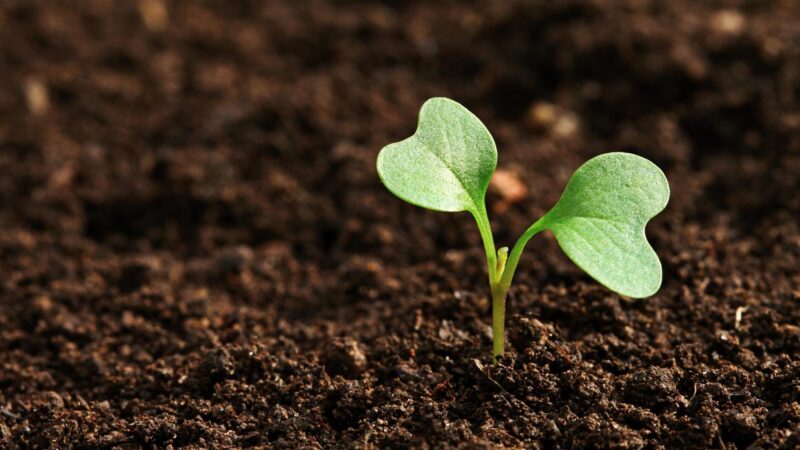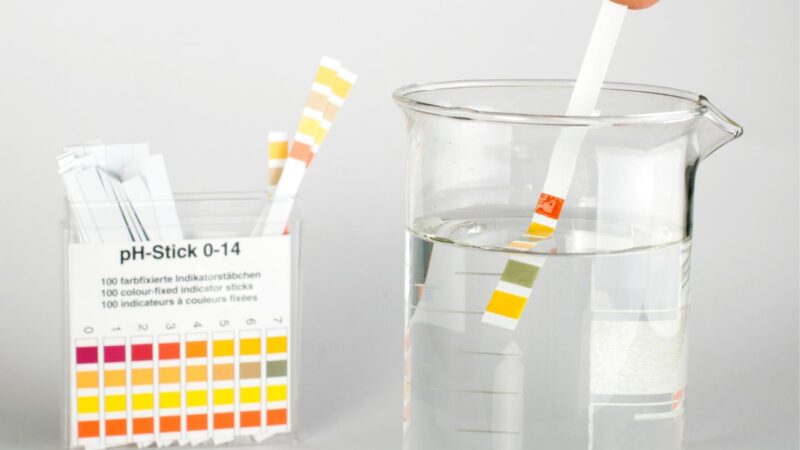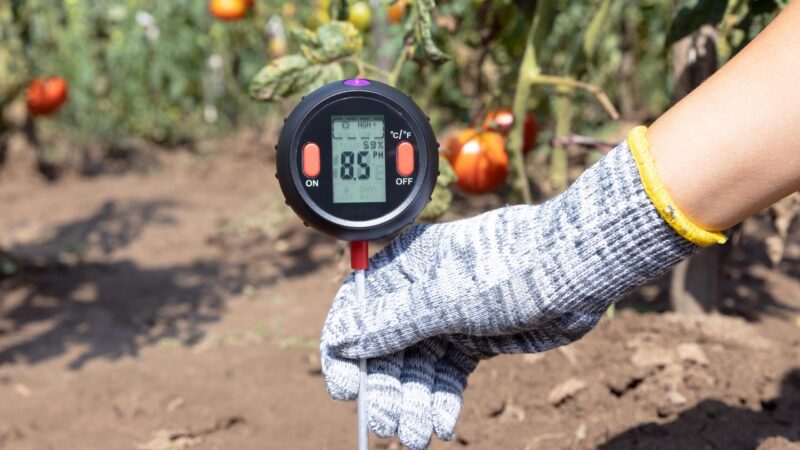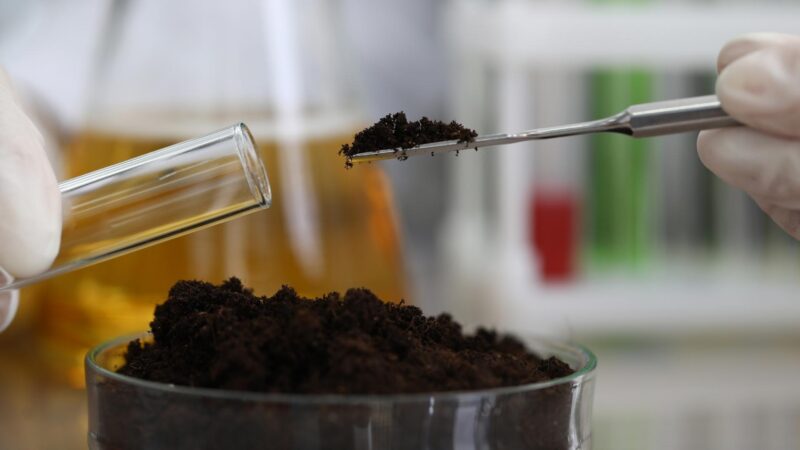Gardening enthusiasts and landscape artists, regardless if you’re considered a professional or a beginner, should know about the importance of determining your soil’s pH levels and knowing what to do with the results.
Soil pH test kits are inexpensive and relatively easy to use home gardening tools without the hassle and effort of testing in laboratories.
This article will provide you with a comprehensive guide on the efficiency of these products, as well as information regarding soil pH, why it matters for your gardening journey, the different types of soil testing kits, how to test soil pH naturally, and more!
What Is Soil?

Soil is a porous part of the earth’s rock crust that is made up of an aggregation of particles, such as sand, silt, and clay, that have been reduced to clods and crumbs. It also consists of minerals, plant and animal remains, decomposed materials, air, water, and other organic matter.
It serves various ecological functions such as a medium for the growth of plants, water absorption and regulation, decomposing dead organisms, habitat for several living organisms, and engineering and landscaping purposes.
What Is pH?

Scientifically, pH measures how much free hydrogen (H+) and hydroxyl ions (OH-) are there in water, soil, or any solution. It tells to what degree something is, whether it is acidic or basic.
pH is measured in logarithmic units, and each unit increase represents a tendolf change in the alkalinity or acidity of a certain substance. The scale ranges from 0 to 14, where 7 is neutral, greater than 7 is basic, and less than 7 is acidic.
An example of a relatively neutral solution is milk, with a pH level of 6 to 7. Baking soda has a pH level of 8, which indicates it is a base, while lemon juice has a pH level of 2, which indicates it as highly acidic.
What Is Soil pH and Why Is It Important?

Soil pH is simply determining the level of acidity or alkalinity of the soil. It is usually influenced by texture, topography, mineralogy, vegetation, as well as the soil’s parent materials from which it was formed.
It’s important to know the pH levels of soil since plant growth is reliant on it. Soil pH affects the plant’s absorption of nutrients, health, and production. A pH level of 6 to 6.5 is the optimal range as it supports the immersion of micro- and macronutrients.
Are Our Soil Testing Kits Accurate?
It depends and varies on the product and the type of nutrient or parameter being measured. Some products do display measurement accuracy, while some simply don’t. Still, testing kits are easy to use and inexpensive DIY-at-home alternatives to laboratory testing.
Why Test Soil pH?
As gardening enthusiasts, you would want to optimize the growth, health, and development of your plants. The best way of achieving so is to ensure your soil is at optimal pH levels.
When pH levels are either too low or too high, it will affect the plant’s absorption of minerals and nutrients. You would have to adjust your soil acidity or alkalinity levels. To do so, you must test your soil’s pH and base your next gardening action on the reading.
Most soil testing kits nowadays will come with guides or booklets that include recommendations on what to do based on the result of your soil’s pH levels.
Do Home Soil pH Test Kits Work?

Home oil pH test kits do work. However, the accuracy will depend on the overall efficiency and quality of the product you’ve used. One thing’s for sure, they’re certainly better than simply using litmus paper.
Soil pH Levels
Ranges in soil pH, in descriptive terms based on the measure of its pH level, are as follows:
- Extremely acidic: Less than 4.5 pH level
- Very strongly acidic: 4.5 to 5.0 pH level
- Strongly acidic: 5.1 to 5.5 pH level
- Moderately acidic: 5.6 to 6.0 pH level
- Slightly acidic: 6.1 to 6.5 pH level
- Neutral: 6.6 to 7.3 pH level
- Slightly alkaline: 7.4 to 7.8 pH level
- Moderately alkaline: 7.9 to 8.4 pH level
- Strongly alkaline: 8.5 to 9.0 pH level
- Very strongly alkaline: greater than 9.1 pH level
Types of Soil Testers
Analog Soil Test Kits
This soil tester tool includes 1 to 3 metal probes, depending on the parameters it could measure, with an analog meter attached.
pH levels are measured by inserting the probe(s) into moist soil or other medium used for growing plants. The probes will pick up electrical charges within the solution, which will appear as a measurement on the reader using a needle to indicate pH levels and other parameters.
Digital Soil Test Kits
May also use a probe(s), but this type of testing kit usually comes as a device with collecting tubes to place soil and other growing medium in them and are then measured directly using electrical charges. It needs batteries or external sources of power to be operated.
Chemical Soil Test Kits
Works similarly to a digital soil tests kit since it also has a container for placing soil in it, but you would have to mix in water to allow the device to measure accurately.
Next, you would have to add a droplet or dye capsule, depending on the product, then shake it thoroughly. The readings will be based on a color coding system to match the degree of alkalinity or acidity of the soil.
Multi-Functional Soil Testers
These testing kits are all the rage for gardening enthusiasts nowadays since they can serve not only as a measurement for pH levels but also for other parameters such as nutrient composition, electrical conductivity, amount of sunlight, and temperature.
What are the Best Soil pH Test Kits?
Bluelab PENSOILPH pH Pen for Soil
A hydroponics pen was built to measure pH levels (both acid and alkaline) and temperature in soil, nutrient solution, and other forms of media. It can be used in rockwool, growing tents, fish tanks, aquariums, coco, potting mixes, and swimming pools.
This waterproof tool comes with an auto-off function, temperature units, low-battery indicator, and automated temperature correction (ATC), which provides accurate calculations regardless of any temperature fluctuations. Its durable design is built for constant and long-term usage.
To use, simply long-press the calibration, remove the probe cover, and then plunge it into a substrate. You can then read the indentation through its backlit LCD. You can pair it with other garden monitoring tools such as meters, a TDS pen, and other testers.
Product dimensions: 13.2″ (length) x 2.3″ (width) x 0.9″ (probe height), with a product weight of 2.4 ounces.
Sonkir Soil pH Meter
A multipurpose garden soil tester that can accurately measure moisture, sunlight level, and pH value. It has a portable and lightweight design, making it easy to carry for indoor home plants and outdoor garden, farm, and lawn use.
This meter tool comes with a large readout scale and three sensors: light, pH, and moisture for its three different functions. It’s easy and ready to use as you don’t need any batteries to power the tool, and you can simply push a button to switch between sensors.
The manufacturer states that this tool shouldn’t be used to measure liquids. Soil should also be adequately moist to be able for the tool to read properly and accurately. It should be probed into adequately moist soil at 6 to 7 inches depth and checked readings after 10 minutes.
Product dimensions: 7.9″ (probe length) x 0.2″ (individual probe diameter), with a product weight of 2.82 ounces.
Bluelab METCOM Combo Meter for pH
This hydroponics meter can measure and monitor 3 parameters: conductivity (electrical conductivity, parts per million, and conductivity factor), pH levels through its double junction, and temperature. The probes are factory calibrated and made with laboratory-quality glass.
When measuring soil pH levels, simply thrust the probe into the moist soil solution and select the parameter you want to measure. The reading will be displayed on its screen, which you can use to record and manage your garden, lawn, or home plant progress.
Like Bluelab’s pen variant, it also comes with an ATC for a more accurate measurement against temperature fluctuations and changes in your soil’s environment. With its lightweight and handheld design, you can easily carry this product with you anywhere!
Product dimensions: 6.1″ (length) x 3.1″ (width) x 1.5″ (height), with a product weight of 5.28 ounces.
Luster Leaf 1606 Rapitest Digital Soil pH Tester
Created with advanced digital LED technology, this soil test kit can accurately measure pH levels and comes with a guide for pH preferences for more than 450 plant species, as well as how to adjust your soil’s pH levels accordingly.
This tester can perform 25 tests, 5 each for phosphorous, nitrogen, and potash, and 10 for pH. Based on your soil’s test results, you can use the booklet that comes with the product, which provides guidelines on fertilizer application.
When measuring, use the dropper to transfer the soil solution into the test tube holder. Then, insert it inside the chamber system. Lastly, simply follow and base the results on the detailed color coding reading instructions for the 4 kinds of parameters.
Product dimensions: 12.2″ (combined length) x 5.83″ (combined width), with a total product weight of 7.7 ounces.
Yoyomax Soil Test Kit pH Moisture Meter Plant Water Light Tester
Providing you with an accurate and thorough report of the light, moisture, and pH conditions of your soil, this multipurpose tool will help supply you with the information you need to adjust your plants’ needs for them to grow healthier and more robust.
With a portable and compact design for indoor and outdoor planting, this soil test kit doesn’t need any external power sources to power up. Just align the switch on your chosen parameter, insert it into 2 to 4 inches of soil, then check the dial after 10 minutes for the reading.
The readout scale will show you if your soil has too much light or too little of it, as well as if it’s overwatered or needs more hydration. Yoyomax warns against the usage of pure water, other types of liquids, hard objects, and dry soil.
Product dimensions: 12.95″ (overall length) x 3.98″ (width), with a product weight of 2.78 ounces.
How Can I Test My pH Naturally?
You can do so by using red cabbage. Here’s how:
Step 1: Slice the red cabbage leaves into small pieces. Then, boil them in water. Make sure the water isn’t acidic, or else this solution won’t work.
Step 2: Boil for 20 to 30 minutes or until the water turns a purplish red hue.
Step 3: Strain the red cabbage pieces from the water. Discard the pieces themselves but save the water in a different bowl as that is now your pH indicator.
Step 4: Place soil or other growing medium into a small container. To test its pH level, pour some of the cabbage water solutions onto the soil.
Step 5: Observe how the color of the water changes after adding to the soil. Use the guide below to determine the level of alkalinity or acidity:
| Color | Approximate pH Level | Result |
| Pink | 1.0 to 2.9 | Acidic |
| Dark Red | 3.0 to 4.9 | Acidic |
| Purple | 5.0 to 7.9 | Acidic or Neutral |
| Blue | 8.0 to 8.9 | Alkaline |
| Bluish Green | 9.0 to 10.9 | Alkaline |
| Greenish Yellow | 11.0 to 12.0 | Alkaline |
What Is the Best Way to Test pH?
You can choose to buy soil testing kits that are proven efficient and accurate, like the products stated in this article, or take a soil test in a trustworthy laboratory as it will be a surefire way of obtaining comprehensive results and leave no doubts in your mind.
Soil pH is used to determine the degree of alkalinity or acidity in the soil as it affects the nutrient absorption function of plants. Soil testing kits are great tools you can use to measure soil pH, but accuracy depends on the quality of the product.
You can also test pH by boiling red cabbage leaves or taking a soil test in a trustworthy laboratory for comprehensive and accurate results.
List of Sources
What Is pH and Why Do We Care?
Soil pH: Importance, Testing & Sampling
Are Garden Soil Test Kits a Good Alternative to Lab Testing?